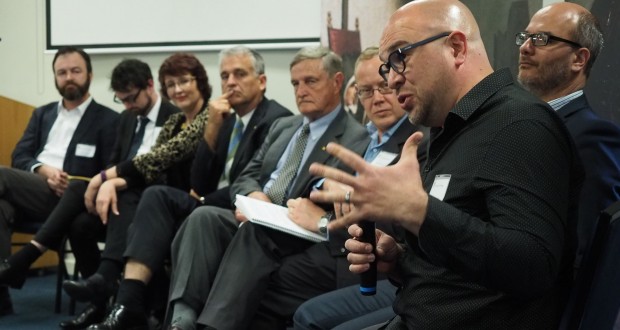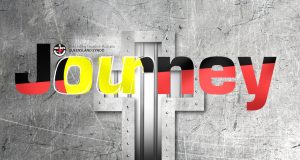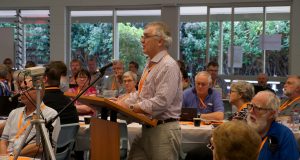Last month, Christian political practitioners and academics gathered to unpack the presence of faith in public office. Ashley Thompson reports.
To what extent should people that hold high public office constrain the expression of their personal faith and its inevitable influence over the performance of their public duties?
Toowong Uniting Church member and director of Emmanuel College’s Centre for the Study of Science, Religion and Society, Dr Leigh Trevaskis argues these questions hold an unequivocal tension in the public space.
“It’s only 50 years since the Nuremberg trials where the defendant said ‘I was just carrying out what the state told me to do, I’m a faithful public servant’,” says Leigh, recalling the prosecution of prominent members of Nazi Germany leadership who carried out the Holocaust and other war crimes.
“But the jury found, ‘No way, you remain responsible in public office. You should have allowed your personal moral framework to say this is wrong to do this to these people’.”
Leigh uses former minister for immigration and border protection Scott Morrison as a modern example. According to Leigh, Morrison’s critics would say he’s personally responsible for allowing abuse of asylum seekers in detention, and that this runs contrary to his Christian faith.
“Yet those same critics are people who posted on Facebook ‘No, it is outrageous that faith should have any influence in public office.’
“So this is what the conference is about. It’s not cut and dry, black and white,” says Leigh.
“So, can one be a politician and still have faith?” asks former Uniting Church pastor and current online editor for the ABC Religion and Ethics portal Dr Scott Stephens. “This question seems to be a complete misunderstanding of what faith is.”
“As counterintuitive as it may seem, I would even suggest that the more pressing question is not whether a religious believer can be a good politician but whether it is possible to resist the suffocating cynicism and self-satisfied irony of modern public life without some reference to faith.”
Conference attendee, St Andrew’s Uniting Church minister Rev Bruce Johnson adds, “The only time the wider community wants to know the church’s opinion is when they want to talk about sex or some other equally contentious issue.
“This is short-selling the impact that faith has on shaping society. I want to help my congregation think through how maybe they can help this conversation happen, from a professional perspective.”
Fiona Simpson, Liberal National Party member for Maroochydore and former speaker in the 54th Parliament of Queensland says, “If you love God, you love people. You cannot stay away from the issues of the day.”
“Society would be poorer if we were to push people of faith out of the marketplace.”
The Centre for the Study of Science, Religion and Society is an initiative of Emmanuel College, auspiced by the Uniting Church in Queensland.
Visit centressrs.org/events/faith_public_office to find out more.
 JourneyOnline
JourneyOnline




